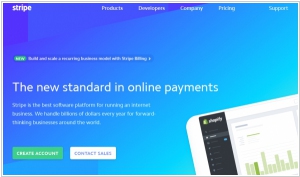Top 10: Online Billing software
Updated: July 31, 2023
Online billing refers to the process of generating and delivering invoices to customers electronically through the internet. Instead of traditional paper-based billing methods, online billing allows businesses to create and send invoices to customers via email or through an online billing portal. This digital approach streamlines the billing process, reduces costs, and accelerates payment cycles. Online billing systems often include features like automated billing, recurring billing, and online payment options, providing customers with convenience and flexibility in settling their invoices. For businesses, online billing improves efficiency, reduces the risk of errors, and enhances cash flow management by tracking and managing payment statuses in real-time. With the increasing digitization of business processes, online billing has become a preferred method for businesses to efficiently manage their invoicing and accounts receivable processes.
Some of the most popular online billing services are listed below.
See also: Top 10 Payment Processing platforms
See also: Top 10 Payment Processing platforms
2018. Stripe launched online billing tool

Stripe is introducing a billing solution tailored for online businesses. This new product enables these businesses to efficiently manage recurring subscription revenue and invoicing within the Stripe platform, streamlining their operations. The aim is to replace previously manual methods of invoicing or assembling various subscription tools, offering a seamless experience similar to charging for products on Stripe. This launch is partially motivated by customer requests for a unified solution that consolidates invoices and subscription expenses. As an enterprise company, Stripe prioritizes understanding customer needs while simultaneously innovating to provide elegant solutions for problems that small businesses may not have anticipated.
2009. Zuora released Z-billing 2.0
A year following its initial market debut, Zuora, the online billing solution designed for SaaS vendors, has recently unveiled Z-billing 2.0. This upgraded version offers 33 new features aimed at boosting revenue. Z-Billing 2.0 introduces an expanded array of billing, pricing, and payment options that can be customized to align with specific market segments. This empowers companies to adapt to market fluctuations by providing services at optimal prices and terms. The inclusion of additional mass updating tools, auto-sync capabilities, and workflow functionality enables customers to streamline their business operations. Furthermore, Z-Billing 2.0 offers enhanced integration options with websites, provisioning systems, accounting software, CRM platforms, and payment systems, ensuring seamless connectivity between all business operation systems. Notably, Z-Billing 2.0 incorporates comprehensive logging and tracking capabilities, providing automatic audit trails to meet compliance and security requirements.
2009. NetSuite takes on Force.com with SuiteCloud

One of the main competitors of Salesforce, Netsuite, has also entered the platform game. Last week, Netsuite announced the introduction of its PaaS (Platform as a Service) solution called SuiteCloud, which serves as an alternative to Force.com. In essence, they have not introduced anything entirely novel. SuiteCloud is an online infrastructure designed for business applications, enabling integration with Netsuite's on-demand solutions such as CRM, ERP, and E-Commerce. It offers developers access to Netsuite's cloud computing resources, application development tools, online billing capabilities, and a marketplace known as SuiteApp.com, where applications can be bought and sold. However, the most valuable aspect for third-party developers is the opportunity to target Netsuite's existing customer base with their applications.
2009. FreshBooks - online billing for small business

There are numerous online billing services available on the Web, each offering their own unique blend of usability and relevance to businesses. However, if you're seeking a straightforward solution that simplifies monitoring your billing cycles, FreshBooks is an excellent starting point. FreshBooks streamlines the management of clients, projects, and, most importantly, invoices. This tool facilitates the generation of recurring invoices and automates the billing process for customers. Furthermore, it is relatively cost-effective, with the option to use basic invoicing for free or pay up to $149 per month to grant additional employees access to the account. In addition to the ability to import from and export to QuickBooks and CSV files, FreshBooks seamlessly integrates with popular payment processing solutions like PayPal. Its intuitive design enables swift completion of invoicing tasks. However, the most valuable feature lies in its tracking capabilities. If you currently employ a rudimentary billing system, you may encounter difficulties in remembering when payments were made or received. FreshBooks eliminates this issue by providing a menu pane that displays outstanding and historical payments, allowing you to stay informed about incoming revenue. Moreover, if you have concerns about the appearance of your invoices, you have the freedom to customize them according to your preferences, including the option to incorporate your company logo.
2008. Intuit launches QuickBooks Online Edition

Intuit dominates the accounting software industry, with its flagship product QuickBooks enjoying immense popularity among small and medium-sized businesses, boasting over three million users. In response to the increasing demand for web-based and online accessible solutions, Intuit introduced QuickBooks Online Edition (QBOE). Although QBOE has been available for several years, its adoption has been gradual yet steady. QBOE fulfills essential business requirements, offering comprehensive double-entry accounting capabilities that enable accurate balance sheets, profit and loss statements, and trial balances. The home screen serves as the starting point for users, distinguishing QBOE from other online accounting applications that aim to present a "dashboard view" of the business. Instead, QBOE presents a process diagram-style interface, allowing users to navigate through different functional areas of the accounting system. The Basic edition of QBOE provides fundamental features such as accounts receivable, expense tracking, and check printing, albeit with somewhat limited functionality considering its $10 monthly cost. On the other hand, the Plus version enriches the offering with additional features like estimates and invoice customization, time tracking, recurrent billing, budgeting, and online billing.
2008. Zuora Raises Another $15 Million For Integrated Online Billing And Payment Solution
Zuora, a Software as a Service (SaaS) startup that provides online services for managing and automating customer subscriptions and payments, has secured $15 million in a second funding round from Shasta Ventures and Lehman Brothers Venture Partners, according to Venturebeat. The company had previously raised $6.5 million from Salesforce CEO Marc Benioff and Benchmark Capital (who also participated in this round), bringing the total funding to $21.5 million. When Zuora launched its online billing solution in May last year, our previous coverage highlighted the company's goal to relieve online businesses from the burden of developing their own billing systems, particularly for handling recurring payments associated with subscriptions.

